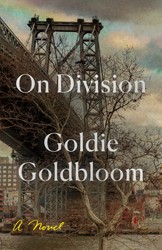At the beginning of Matthew Daub’s moving coming-of-age novel Leaving Eastern Parkway, the young narrator, Zev Altshul, undergoes devastating tragedies that compel him to flee his closed world of Lubavitch Jewry, the ultra-Orthodox enclave along Eastern Parkway in Brooklyn.
It turns out, however, that Zev has already been acting on his own shameful urge to go “off the derech,” to swerve from the path directed by the strict expectations of Hasidic life. Like his older sister Frida (ne Frayda), who left the fold years before to pursue a reimagined OTD life as an artist, Zev has found his own path (an alternate, or perhaps “higher” school, as his name suggests?), another way to express his need for spiritual meaning. Zev’s new derech, it turns out, is handball, specifically “one-wall” handball, made famous on the hardscrabble — and now mythic — courts of Brighton Beach, Brooklyn, where players with memorable names like Vic Hershkowitz and Moe Orenstein once ruled. “I am,” Zev confesses, “in deeper communion with Hashem on the handball court than in prayer or Torah study.” Packing to leave Brooklyn, Zev places his handball gear “next to my tzitzit and tefillin. These conflicting objects told the story of my life.”
Handball suffuses Zev with a religious fervor bordering on the ecstatic. Leaving Eastern Parkway charts his spiritual and moral growth as he displays his superb physical skills, his uncanny ability to analyze opponents’ weaknesses, and his obsessive need to win. In the process, this Jewish city game emerges as Zev’s surrogate religion: handball looms, in this respect, as the symbol of Zev’s longing for a more meaningful, personal Zion, a place where his ungrounded Jewish self can call home.
The emotional landscape sketched in the novel is filled with surrogate father figures who help Zev allay the pain of his numerous hurts, above all the trauma of filial betrayal and a piercing sense of guilt for having turned away from Orthodox Jewish practice. Daub keeps his hero moving, geographically and spiritually, from Hasidic Brooklyn to the less rigorous but more empathic world of Reformed Judaism found in the college town of Urbana, Illinois, where Zev flees with his secular sister to escape the life-threatening clutches of Eastern Parkway.
Along the way Zev meets Joe Carcone, one of the “rebbes of the street game,” who will become the key influence in the young man’s life. Joe is, like Zev, in exile from his native Brooklyn, a fellow misfit displaced in the Midwest. Upon his first encounter with the young Jewish handball phenom, Joe exclaims, “’You’re what I’ve been praying for, Junior.’” The feeling turns out to be mutual. Zev senses “the sadness in Joe Carcone’s voice.… I thought he must be just like me — happiest when he is playing handball.”
For Zev, Joe becomes a therapist, a confidante, a protector, and ultimately a rebbe, whose handball philosophy teaches Zev how to be a mensch. For Joe, Zev replaces the son he has lost, allowing him a measure of reconciliation with his unresolved past. “I was,” an awakened Zev now recognizes, “his shot at redemption, his second chance to be a better father and prove to himself he was not the same man who had brought such pain to his family.” In the end, their shared passion for handball binds them, leaving a balm of “rachmones” — Jewish mercy — on their mutually self-lacerating, tortured souls.
Readers may locate a key complement to Daub’s novel in the great Brooklyn-born photographer Jerome Liebling. In his stunning collection, The People, Yes (1995), he captures the world of Jewish handball players, aged but still magnificent. “They have become gladiators of a sort,” Liebling reflects, “embodying all the valor that a life of physical movement, sweat and great savvy bring to age.” At the end of Leaving Eastern Parkway, Zev aspires to an equivalent mythic status: “The tough as a gristled brisket Jew who would rule the courts of New York.” In the end, it remains an open question whether Daub’s handball-obsessed hero will indeed fulfill such a heady self-prophecy.
Donald Weber writes about Jewish American literature and popular culture. He divides his time between Brooklyn and Mohegan Lake, NY.





